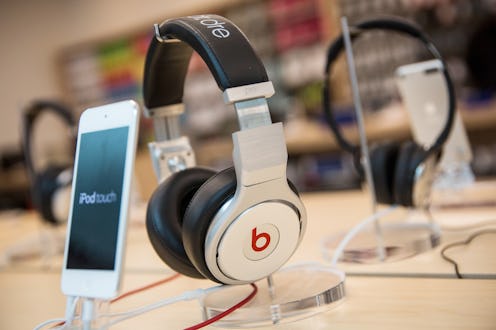News
Don't Bring Yours To The World Cup

Leave your Beats at home if you're planning on attending a match at this year's World Cup. The body that presides over the games, FIFA, has officially banned Beats, Dr. Dre's hardware. The ubiquitous headphones are worn by notable soccer stars including England's Wayne Rooney, Uruguay's Luis Suarez — who just scored two goals against the English on Thursday — and Brazil's beloved Neymar. And this is a big problem because it is Sony, and not Apple or Beats, that is an official sponsor of the 2014 World Cup.
Consequently, Beats will no longer be allowed into the stadiums, which shouldn't pose too big of a problem, considering fans in attendance will most likely be more interested in the game than what's playing on their iPod. But then again, it's the principle that seems a bit ludicrous. What's next, FIFA? Banning Nike shoes because Adidas is a sponsor and Nike isn't?
Beats, which was recently acquired by Apple for a cool $3 billion, is widely considered to be the headphone of choice for many athletes, celebrities, and musicians. The casual frequency with which these famous individuals don their Beats provides the company with plenty of passive endorsements, and has certainly lent to their popularity. And according to some marketing experts, it is precisely because Beats is not directly involved with the World Cup that makes images of players wearing the headphones so effective.
Ellen Petry Leanse, a former executive at Apple and Google, told Reuters:
When fans see World Cup athletes wearing Beats in their downtime, by choice, it has as much impact as seeing them lace their Adidas (boots) or sip a sponsored beverage.
Indeed, it does make their usage seem more "authentic and credible." But then again, it is unlikely that fans keep careful tabs on which companies are and aren't official sponsors. And considering the massive amounts of advertising Beats has done around the World Cup, many may be surprised to learn that they are not, in fact, affiliated with the games.
Just a week before the World Cup officially kicked off, Beats launched one of its largest campaigns ever with a YouTube video entitled "The Game Before The Game." The five minute long promotion for Beats Solo 2 headphones, a remake of their best-selling pair, features no fewer than 11 World Cup stars from effectively every major country competing for the title, including the Netherlands, Germany, Mexico, and the United States. There are also "special appearances" by LeBron James, Serena Williams, and female soccer sensation Sydney Leroux.
The video is captioned:
Before the goals, before the glory, there is an unseen game played in the locker room. Watch how the best prepare for greatness with Beast SOLO2 and Studio. This is how the game is won.
Subtle guys. Really subtle.
This is certainly not the first time Beats has come under fire for its so-called "guerrilla marketing" techniques, using viral online campaigns, widespread celebrity usage, and other generally low-cost, high-visibility methodologies to circumvent licensing issues. In 2012, Beats faced a nearly identical situation with the British Olympic team. In another display of guerrilla marketing, Beats sent several boxes of headphones to athletes in London, some of which were decorated with the flags of the athletes' representative countries.
The hometown team was particularly enamored with this patriotic headgear, with diving darling Tom Daley and goalkeeper Jack Butland clearly big fans of the headphones. But when Butland took to Twitter to express his appreciation, he landed the entire English contingency in hot water. Unfortunately for Daley and Butland, it was Panasonic that served as a sponsor for the national team, and Olympic rules prohibited athletes from endorsing a product from a personal sponsorship. Even though Beats did not pay Butland for his tweet, even wearing the headphones would be considered a violation of the rule, and consequently, the British team banned the headphones.
They did say, however, that should team members need to engage in some music-listening, their Panasonic headphones would serve them perfectly well.
While the FIFA ban is meant to tone down the popularity of the headphones in favor of Sony's version of the product, it is likely that such a move will backfire — at the very least, Beats are certainly receiving a spike in media coverage as a result of the ban. And with few players seen with Sony headphones, it seems that Dr. Dre's Beats are here to stay, even if not in the World Cup stadiums.